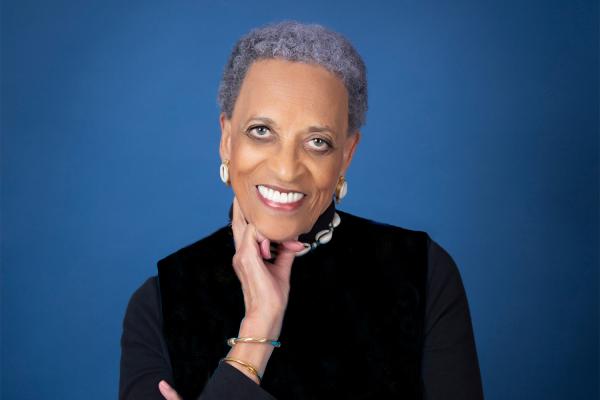Johnnetta B. Cole
National Humanities Medal
2021

—Photo courtesy of Johnnetta B. Cole

—Photo courtesy of Johnnetta B. Cole
WHITE HOUSE CITATION
Johnnetta Betsch Cole, for being a celebrated leader of sanctuaries of higher learning and culture. A scholar, anthropologist, and academic pace-setter, Johnnetta Betsch Cole’s pioneering work about the on-going contributions of Afro-Latin, Caribbean, and African communities have advanced American understanding of Black culture and the necessity and power of racial inclusion in our Nation.
“Until you’ve been in another’s place,” Johnnetta B. Cole wrote in 1997, “you don’t fully know your own.” The inveterate anthropologist has been many places over her six-decade-long career. By turns a professor, college president, and museum director, Cole has a storyteller’s conviction: No one is too remote, too foreign, to know.
Born in Jacksonville, Florida, in 1936, Cole remembers sitting on the living room floor as a child to leaf through her mother’s art catalogs, books, she says, that were too heavy to lift. An English teacher and registrar, Cole’s mother filled her home with dazzling African American art, including reproductions of the work of Charles W. White and Elizabeth Catlett (her mother had “the eye,” Cole notes), and classic works of literature—Homer’s The Odyssey, Dante’s The Divine Comedy, and Victor Hugo’s The Toilers of the Sea—titles on Cole’s bookshelf today.
While hers was an upper-middle-class Black family, Cole “quickly discovered that money could never really protect me from racism,” as she wrote years later. Her great grandfather, Abraham Lincoln Lewis, was Jacksonville’s first Black millionaire; still, much of the segregated city was off limits to her. When she was five years old, Cole skipped into a whites-only neighborhood, where a boy called her the N-word. The experience “tore at me,” Cole recalls, “as if the boy, no bigger than I was, was attacking me with daggers.”
One of Cole’s escapes was the library, a brick building where Olga Bradham, the head librarian, would have a stack of books waiting for her, titles, Cole remembers, “that would take me around the world.”
Those books took her to Fisk University in Nashville, where she enrolled at fifteen. At Fisk, she came face-to-face with the works of art she’d seen as reproductions growing up: “Now I saw the real thing.” Cole later transferred to Oberlin College, in Ohio, where she signed up for a cultural anthropology class. Her life, ever after, was changed.
In anthropology, Cole found a new way of being in the world. She thinks of it as a pair of glasses, Cole says, “through which you see the human condition.” Her studies took her to Liberia and Haiti, among other countries, where she learned that human beings are, at once, extraordinarily different and fundamentally the same.
Following a series of professorships at Washington State University, the University of Massachusetts, Amherst, and Hunter College in New York City, Cole was named president of Spelman College in Atlanta, in 1987. The first African American woman to hold the title, Cole saw great potential in the students at the historically Black college for women. “If we did our work well,” she said, “they could change the world.”
Cole has an impulse to explore and encouraged her students to do the same, taking a step, then another, off the beaten path: “Imagine if every student was required to spend time working, studying, or residing in a country, culture, or community other than his or her own,” she wrote.
In 2009, Cole was named director of the Smithsonian’s National Museum of African Art. Being at the helm of the museum, was, for Cole, an honor. “To bring the experience of art into one’s life,” Cole says, “is to become entangled in, maybe to fall in love with, human creativity.”
The anthropologist has also served as president of Bennett College in Greensboro, North Carolina, the only other historically Black college for women, and chair of the board for United Way of America, among other appointments.
Cole has about her a remarkable poise. Wearing a jacket of vibrant yellow and black abstractions, she sits in her library—“a place of contemplation,” she calls it—before a wall arrayed with photographs, drawings, and sculptural prints. “I curated that wall behind me to represent the periods of my life,” she says as she gestures to a sketch of Zora Neale Hurston, also an anthropologist, and a drawing by David Driskell, “one of the deans of African American art.”
Asked to imagine a world without the humanities, Cole furrows her brow. “What would the world be like if there was no literature?” Cole asks, looking over the floor-to-ceiling books to her left. “That’s a frightening notion. You’re asking me to imagine a nightmare.” Her books, her art, are proof of a life lived and of Cole’s central belief: People, however different, are worth knowing.
—Angelica Aboulhosn